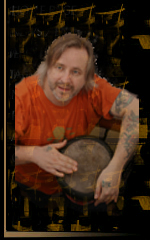
REVIEW
FROM CHENNAI, April 11 2003
DO the words `gyil' and `darabuka'
strike a chord? Or have you missed the beat completely? Never mind; the
players of gyil and darabuka won't. Got it! These are musical
instruments, insignificant to many, but which are vital spokes in
percussionist Pete Lockett's musical mission to integrate different
traditions and styles of the world.
Gyil, which has its origins in Ghana, is made of wooden boards that rest
on a frame over calabash gourds. The player has two sticks with which to
strike the board, much like in a xylophone. Darabuka, which has West
Asian roots, is goblet-shaped — bigger than the South Indian temple
instrument udukkai; another difference being that, unlike the latter,
darabuka can be played with both hands, with one hand doing the primary
job of holding on to the instrument. These instruments were in action
during the workshop conducted at the British Council, Chennai, by Pete's
group, Network of Sparks, which includes Nana Tsiboe and Simon Limbrick,
who are multi-instrumentalists like Pete.
On this tour of India, the group has performed in New Delhi, Kolkata,
Mumbai and Chennai, with kanjira player and son of ghatam vidwan T.H. `Vikku'
Vinayakram, V. Selvaganesh, and members of the Indian band Mrigya.
The challenge in introducing gyil and darabuka to an Indian audience or
tabla and kanjira to a Western audience lies in presenting the music "on
a platform which is recognisable by the people", says Pete. A sample of
this was evident during the workshop when Pete tried to replicate on the
darabuka the mridangam korvais, about which he has studied.
Network of Sparks has worked with various musicians in different
countries whose traditions it has tried to integrate into its music. To
start with, "we agree on a common goal," says Pete. This goal, however,
doesn't restrict an individual's freedom of musical expression, although
it also doesn't allow domination by a single musician or a genre. But
there are similarities in cultures, which allow a musician to move from
one to another, says Simon.
Understanding the music isn't enough; one has to understand the culture
too, the musicians say. This becomes even more important for African
music, which has been an integral part of the group's concerts. Ghanian
Nana says the African drumbeats are actually phrases! So, in order to
play a phrase, the percussionist has to understand the context in which
it has been said. Quite a task!
The group is clear about what it aims from such an experiment. Not
money, for sure. "Why should I care about commercial viability," asks
Pete. "Playing music inspires me. I want to learn and be challenged."
RETURN TO INTERVIEWS /
PRESS MAIN PAGE

Click here to return to
the Network of Sparks page
 |

